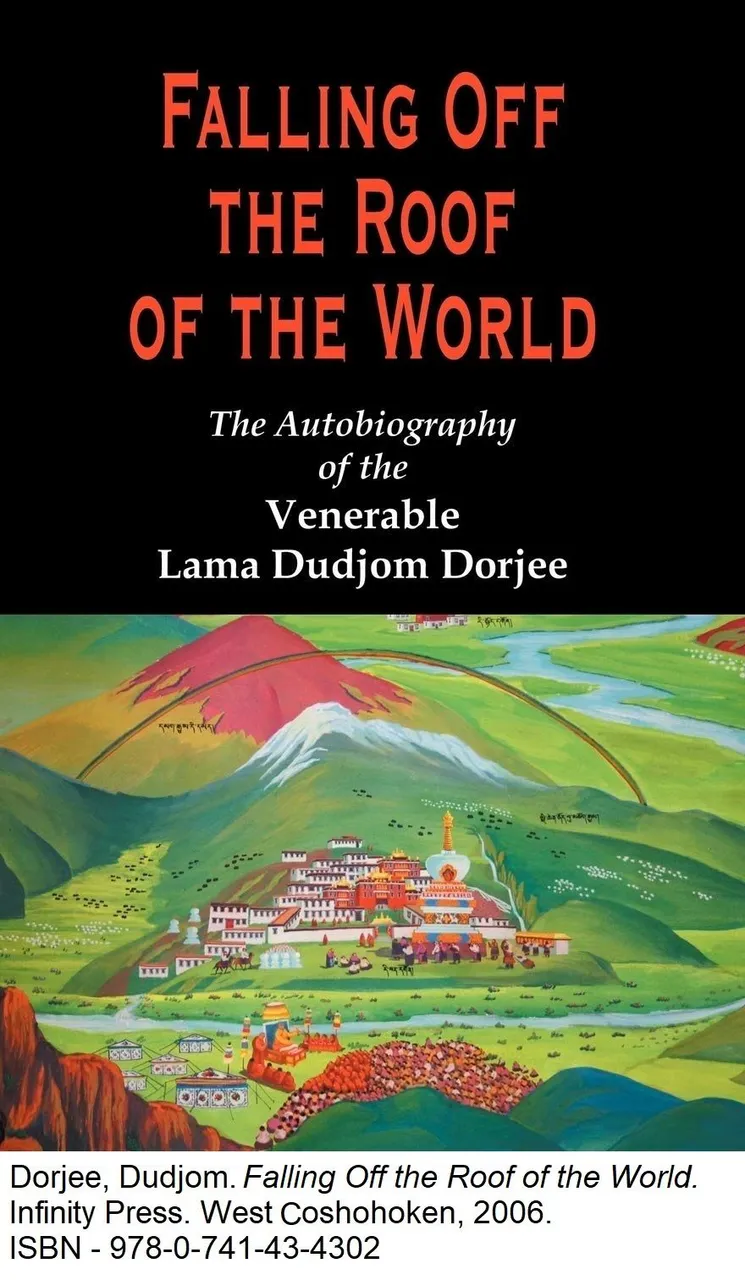An Impulse Purchase
When I passed by this book on the shelf at the Frisco, Texas branch of Half Price Books some time in late Autumn of 2020, it wasn't something I had been looking for. In brutal honesty it was a book I'd never heard of, by a monk I'd never heard of, who presided over a religious assembly I'd never heard of (I didn't even know Dallas HAD a Buddhist community called Karma Thegsung Choling Dallas, or that there was a Tibetan Lama leading it). But I had already decided that my reading selections in 2021 were going to be a year-long study of Tibet (just as 2020 was a year-long study of Catherine the Great and Grigory Potemkin). So I figured "it's about Tibet, it's here, it's cheap, it's short. It'll do for some light-reading in between bigger books."
Basically, that's precisely what it turned out to be. No regrets about the 3 bucks I spent on it. It was a great way to stay busy on a train-ride from Kharkiv to Kiev and back on an errand to fix China's one last little fuck-up in my life. But no fireworks either. Let's discuss it.
Light and Fluffy
When I started on this book I had just finished Warren Smith's Tibetan Nation and the decision to read something less demanding was deliberate. The book weighs in at 197 pages in what looks like about 14 point font, and about a third of those pages are photos. There's not a lot of history, only a smattering of politics here and there (it's an autobiography of a man who fled the Chinese invasion of Tibet as a small child, after all), and nothing that really exercises the cranial muscles that hard.
Admittedly, the author describes very little about Tibet itself (he was a small child when he fled after all). Instead, it describes his life as a refugee in India, his journey from poverty to prestige through education and tenacity, and the experience that led him to his present role as the so-called "Jolly Lama," a charming and lighthearted nickname given to him by the Buddhist community of Dallas.
The thing I noticed was that the author does not spend a lot of time protesting his People's harsh treatment at the hands of the Chinese. In a fashion that's consistent with... well, a Buddhist monk (gee, fancy that), he seems to regard the horrors Tibetans endured from the Chinese as simply a fact of life, and looks upon them with no more bitterness than a storm survivor has when discussing a storm. He focuses instead on his pride in the resilience of the Tibetan People in the face of this adversity.
No "Captain Ahab's" Here
The first mention of the author's escape from China is on page 36, complete with vivid imagery of the full moon shining on Tibet's snow the night the Chinese invaded.
The last mention of Communist troops is on page 40.
Though the author describes the PLA using fighter planes and bombers to pursue his party of starving unarmed civilians on foot (p. 37), the casual and senseless murder of an elderly civilian who wasn't even resisting by a PLA machine-gunner just to make a point (p. 38), entire Tibetan villages where every man had been led away to prison camps so the women could be collected later when it was convenient and taken into forced concubinage by PLA officers (p. 39), and the grisly sight of a trail littered with decapitated and bullet-ridden corpses of Tibetan civilians including elders and children (p. 39), the author does not dwell much on this. Indeed, if this trial left any trauma or scars, the author gives no indication. While the Dalai Lama's biographies and memoirs almost invariably include an emotional appeal on behalf of the persecuted Tibetans, Lama Dorjee makes no such statement. Instead, the book is a lama's testimonial of how his Buddhist Faith impacted his life and how his childhood led him there.
No Apologies
Having spoken of the author's devotion to Buddhism and its centrality to the book's narrative, it should be mentioned that the author does not bother to tapdance around this spiritual aspect of his autobiography either. He takes it as an axiom right from the onset that the things he sees as omens and signs were, in fact, omens and signs. From the author's account of his uncle's prescience and clairvoyance on page 21 to the dreams and Holy Visions he gives an account of on page 114, the author makes plain that he has no question of having witnessed the supernatural, nor does he give any disclaimers or issue any "I know some people don't believe as I do" apologies. I am not of the same religion as the author is but I'll say this: I have to admire his resolute Faith.
Nothing to Hide
It's with tongue in cheek that I point out that the author does mention some things that lend a bit more credence to China's propagandized narrative on Tibet's "development" under their rule than I'd really like the Party to have. On pages 52 and 53, the author gives a frank and open account of the conditions Tibetans faced in the refugee camps in India, and how the refugees found themselves working long hours for virtually nonexistent wages for the benefit of their host country, a fact exploited by Chinese propagandists back in Tibet who told Tibetans they would be "enslaved by India" if they fled.
Also, when the author describes his return visit to Tibet in the 1990's, though he does describe the poverty in Lhasa compared to its former splendor before the occupation (p. 157) and the palpably oppressive Chinese military presence everywhere in occupied Tibet (p. 158), he is not shy about pointing out how his relatives, who collaborated with the Communist regime, had grown wealthier than they could ever have dreamed of being in an independent Tibet (p. 174). I cringed as I read this, knowing that if the book ever finds its way into the claws of a Sinobeast, these passages will be twisted and cropped to say "see? Even a Tibetan refugee admits how much richer he would have been if he'd stayed behind instead of going to India and laboring like a dog."
So Who Should Read It?
Well, with virtually no historical, geographic or societal topics discussed at any length it's not of much use to a Tibetologist. It also doesn't pack much firepower in the propaganda war against China's 50 cent army (except perhaps as a reinforcement of Jamyang Norbu's account of the PLA using bomber planes against shepherd villages and defenseless monasteries). In fact, it has the danger of backfiring if used on that particular battlefield of words, as mentioned above. However, if you're a Buddhist then this will be a nice little inspirational morsel, sort of the same thing to a Buddhist that a short Billy Graham book would be to a Southern Baptist or an Evangelical. If you want to read an account of the life of a Tibetan refugee and how these resilient people have adapted to the reality of separation from their beloved homeland without the albatross of China (and the political connotations any mention of China always brings with it when discussing Tibetans) hanging around its neck, then this fits the bill.
Admittedly, since the political ramifications of China's abuse of Tibet was my primary target of study, I found this disappointing. However, I'm forced to admit that if the lama who wrote this book heard me say that, he'd shake his head and say "that's the problem, and you missed my point."
The book is the personal testimony of a Buddhist Lama, not a political treatise or a history text. It doesn't hide that it is such.

